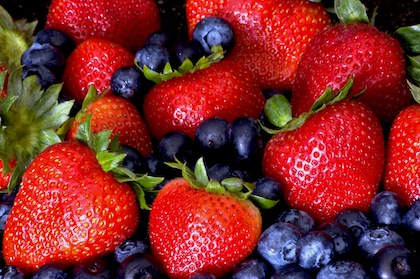With homebrewing comes the epiphany that nearly anything can be included in a beer recipe, and the familiarity with fruit beers over the past 20 years has made those a favorite among us. But, blending malt, hops and fruit is best negotiated with care and forethought. Even so, the possibilities are numerous, since fresh fruit is often seasonal, cheap or even free, and frozen fruit and purees are always available. Some fruit seems destined for beer, others, not so much. We also have the luxury of wide-eyed experimentation that a small brewery might not. The physical nature and fermentability of fruit warrants some consideration though, as does the flavor contribution, and the way it meshes and lifts the base beer. Also, fruit sugar is complex and different in composition from malt sugars, honey or simple sugars. Brewing with fruit is a delicate trip indeed, but one worth exploring.
Handling Fruit
Much like varietal honey, aroma is much of the charm of using fruit in brewing, and it is best to add it when primary fermentation is finished or waning. Those wonderful, estery aromatics are flighty and fickle, and will be scrubbed away by CO2 during vigorous fermentation. I use a bucket for fermentation with lots of headspace and add the fruit at the end of primary. Crush larger fruits to allow the flavor and sugars to seep into the fermenting beer. This will kick start another fermentation. (Note: Suspending the fruit in a mesh bag will minimize pulpy sediment.) When this has run its course, rack to a carboy, being very patient with this secondary fermentation since the fruit sugars may ferment lazily. This is especially important if your beer is destined for bottles and the possibility of bottle bombs. If you fear contamination, pasteurize the fruit by heating to 145 degrees F for 30 minutes (potential pectin formation), or use campden tablets to sanitize the fruit. Fully fermented beer is less likely to become contaminated than unfermented wort, but some rogue organisms are still at home under those conditions.

(Kinsley Dey)
Fruit contains pectin, which can cause a slight turbidity, similar to chill or starch haze that is amplified with heat. You can avoid this with pectinase, an enzyme available at any homebrew shop. A little haze though, especially in a wheat-based brew, stout or porter, may not matter. If you want your beer crystal clear, pectinase might be the answer.
The amount of fruit needed to enhance beer is enormously variable, so consider a pilot test gallon first. Consider the effect that you want, subtle, average or forceful. This is entirely a trial-and-error endeavor and depends as much on the fruit as the beer style. It might be wise to make a base 5-gallon batch and ferment a gallon of that on the side with a measured amount of fruit to gauge the dosage.










